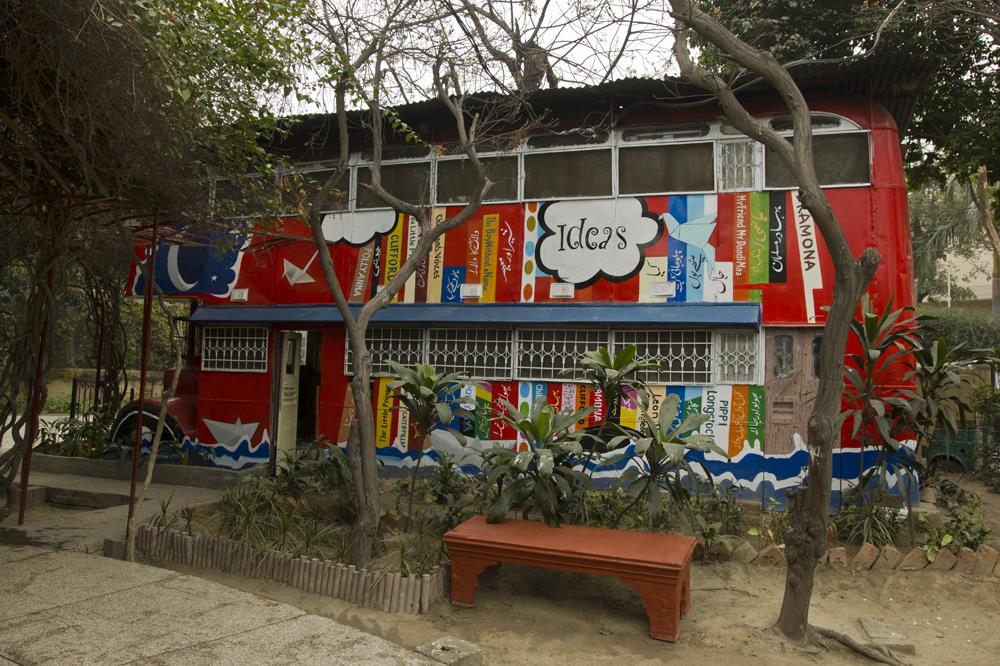The Book Bus Speaks
Basarat Midhat Kazim
The name chosen for me was ‘Alif Laila’ from Alf Laila wa-Laila, The Thousand and One Nights. They say names wield strange power and so my destiny was to be similar to that of Scheherazade, who not only kept herself alive through her gutsy innovations, and cleverly spun tales, but also transformed the mindset of a king.
The year was 1978, the month, June, when I took on the all-important task of instigating the first children’s library in Pakistan. Of course, months of careful planning had been invested to make this happen. I had been seen and chosen from the Punjab Road Transport Corporation’s yard where double decker buses not considered road worthy, stood quietly. But before I could have children racing up and down my decks, looking for just the right book, I needed a safety check. Was I strong enough to remain in one place and support all that excitement? The engineers who examined me declared me 100% library fit and then began a flurry of activity. Out with the seats, in with the shelves, carpets, books, mural, colour, excitement . . . children.

Book Bus.
Fortunately, I tickled the imagination of adults as well. While children happily lost themselves in the world of fantasy and fiction, adults came to explore what it was that made an ‘old double decker bus so enticing’. Granted I instigated the first children’s library in Pakistan but even in the early 1980s some schools did have libraries. Why were the children not equally drawn to those? Was it the friendly air, the welcoming environs, the sense of trust that set the Book Bus apart, they wondered? The seed for transforming libraries into joyful living spaces was germinating!
On a lovely afternoon in April 1983 a young boy from the neighbourhood brought a small television and his family’s newly acquired video cassette recorder to the upper deck and invited other friends to watch a beautiful children’s film with him. What a delightful sense of community! I was enthralled.
The year 1986 marked another milestone. Appreciative of the work a small double decker bus was doing to draw children closer to books and reading, the Government of the Punjab first declared that ‘children’s libraries modelled on the Alif Laila Book Bus should be dotted all over Pakistan’ (unfortunately that has not happened yet) and then constructed and gifted a circular building in the park where I stood, to become the Alif Laila Reference Library and Audio-Visual Centre. The idea that libraries needed to become community centres was being welcomed.

Circular building – the Alif Laila Reference Library and Audio-Visual Centre.
The Story Teller or ‘Dastangou’ came in to do what I could not. 1997 saw the birth of this library on wheels that started visiting children in their schools, taking to them books they never knew existed. In one of Dastangou’s visits to a rural school on the outskirts of Sheikhupura a girl gleefully looked through a story book and remarked, ‘Books contain lovely stories and pictures too. I always thought they contained only texts to be learnt in school’.
What gives me immense pleasure is that more and more people started viewing me as a model on the ground, something they would like to adapt for their own communities so even though the ‘Charge of the Book Bus Brigade’ did not happen, libraries and community centres started mushrooming all over the country, and, more often than not, the colour and general excitement of Alif Laila were replicated.
In 2005 a massive earthquake struck Azad Jammu and Kashmir. The cities of Bagh and Muzaffarabad were razed to the ground. Thousands of school-going children were buried under the debris of collapsed buildings. Those who survived were traumatised and hopeless. Concerned individuals wondered how to make the children smile again.
The IBBY Foundation came forward with a grant to set up a children’s library in Bagh. This library was conceived keeping the rainbow in mind and took its name ‘Dhanak’ from the rainbow. Another agency supported the setting up of Play Buses called ‘Khushi’ or ‘Joy’. These mobile book and toy libraries scattered joy where they went and many a child looked to them for smiles and laughter.

Storyteller library.
Sheherezade’s Khazana or Treasure Trove were 42 libraries of 1,001 books that went out to 42 different locations in four provinces of Pakistan: Punjab, Sindh, Balochistan and Khyber Pakhtunkhwa. Like Scheherazade, these libraries carried the tales of different peoples and climes to children who became wrapped up in their fascination.
The place which has been home to me for over 44 years is a small park in Main Market Gulberg, Lahore. Just opposite the park is a large mosque which also houses a madrasa, a school where young boys are trained to read and learn the Holy Quran. Some of these boys have been frequent visitors over time and stories have held a special enchantment for them. What a moment of joy it was when five madrasas in Lahore agreed it was good for their students to peep into the world of stories and said that they would welcome small libraries for their students. With sponsorship from the IBBY Yamada Fund these became a reality.
Word spread and I become a hub of activities related to books and children. One of the memories I hold dearest is the intense buzz of books coming in all day to be sorted out and distributed to 140 school libraries I helped set up in Southern Punjab.
Just five short years after massive earthquakes jolted Pakistan, the country was left reeling again. Floods, the like of which had never been seen before, washed whole communities away and made thousands of children homeless. When schools became operative again after this disaster, they needed succour for those who bore the scars of displacement and loss. The Books Build Bridges libraries, supported by IBBY friends from all over the world, found their way into a few hundred schools of the worse hit areas. These were simple, low-cost libraries that brought to children a range of stories and fables – books they read and enjoyed, books they discussed with their friends and books they held onto for dreams and hope.
When Malala Yousafzai was attacked for her commitment to education, I spoke up. I couldn’t visit her school in Swat, but I sent in what support I could – parcels full of books so the students could move through their shock and terror, to find laughter, escape, and proof the world can be a better and happier place.
Believing as firmly as I do, in books as a lifeline, I knew it was important to reach children in their native tongues, in words that are as familiar as their parents’ voices. Translations expand our world, but there is a deep comfort in reading stories told in words you have known as long as you have known life. I was thrilled when Hoopoe Books reached out to me to help distribute the stories of Idries Shah across Pakistan. I love these stories for they contain invaluable wisdom from our Sufi traditions, but what made the books extra special is that they are bilingual. Told in Urdu and English, or Urdu and Sindhi, Urdu and Dari, and Urdu and Balochi, these stories will truly land in the hearts of those for whom they are intended.

Urdu – Sindhi. Cover and first page. Copyright © 2021 Hoopoe Books.

In 2011 the neighbouring town of Sheikhupura was inspired to set up a library shared among a cluster of nearby government schools. A small van went around to communities, sharing the joy of books with delighted children, and rickshaws, the three-wheeled small vehicles that whizz in and out of traffic and so common in our part of the world, became mobile libraries too! They proudly took boxes of books along dirt roads and out of the way places.
I had always loved the metaphor of books as vehicles, and started thinking about how we could combine books with other forms of transport. We already had libraries in buses and rickshaws, but we added two book bikes, and, very excitingly, camel libraries! Our first book camel, Roshan in Mand, Balochistan was so hugely popular that many community-based organisations reached out to start these libraries in their areas. We now have eight camels – Raunaq, Aman, Khushi, Mashal, Chirag, Umeed and Estaal – the latest addition having been sponsored by the IBBY Yamada Fund. Each of these camels traverse their own paths in individual regions across Sindh and Balochistan. Though separated by space, they are caravan in spirit, journeying towards a brighter, more literate future.
Mine has been an eventful life and while the wisdom of the East remains with me let me say what I have found worthwhile. Much as I have loved having children run to and from me with treasures they have found and stories they can build memories upon, I have revelled in the knowledge that I have been an idea, a harbinger of change.
Fortunately, the Book Bus has become a symbol in Pakistan for the rich colour and excitement books bring to the barren landscape some of our children inhabit. Libraries and reading programmes are now being developed all over the country, debates and discussions are taking place on how books transform thought and lives. To celebrate 65 years of IBBY I sent out a call for books, and so many people responded. Children, schools, publishers and friends brought in enough books that we were able to assemble 650 box libraries, each containing 100 books, for schools and organisations across Pakistan, in places where reading material for children was greatly needed. This project continues to date, and the change it brought about in attitudes is still being spoken about.
The Book Bus became successful because it believed in children. Operating consistently on a shoe-string budget, it was a risk taker, opening its doors to children, and trusting them all, irrespective of where they came from – glorious mansions or hovels in slums. No more looking at books as the far away creatures that remained on shelves gathering dust and mould. They were alive and belonged in the hands of children.
This trust we placed in children not only minimised book loss, it saw us through financially hard times with children donating their entire book collections to the library. The mutual affection between the bus and its visitors extended to a collaboration between the children themselves, as they often read to and with each other. Children understood the power books wield and became active in rallies for reading, creating posters, carrying messages and demonstrating to all and sundry that books are vital.
Can I now rest on my laurels and call it a day? Not yet. Not until every child in Pakistan is reading!
For decades Basarat Midhat Kazim has been providing meaningful education in Pakistan to children, especially girls, from disadvantaged, social and economic backgrounds. She is responsible for the growth of the Alif Laila Book Bus Society from a children’s library to an entire educational ethos. She is currently working on Children Setting Up Children’s Libraries, in the hope that the map of Pakistan will be dotted with such libraries where children are the enablers and implementers. She helped set up the first camel library in Pakistan in Mand, Balochistan, and a second one in Tharparkar; the camel caravans now numbers eight. She also initiated Pakistan’s first Book Bike in October 2020. After Pakistan’s devastating floods this monsoon, she has initiated playful learning spaces for children in tents, some of them going to those areas that have not yet received aid.
